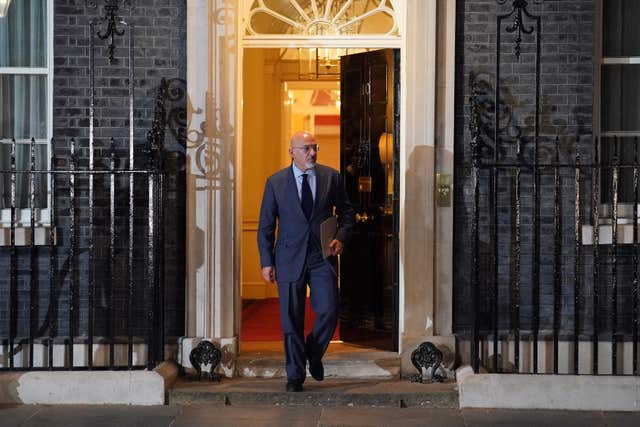Boris Johnson on brink as resignations from his Government continue
The Prime Minister’s position remains perilous with junior ministers and aides following Rishi Sunak and Sajid Javid in quitting.

Boris Johnson is struggling to maintain a grip on power in No 10 as ministers and aides continue to quit his Government in protest at his leadership.
Robin Walker resigned as schools standards minister, telling the Prime Minister the “great achievements” of the Government have become “overshadowed by mistakes and questions about integrity”.
Will Quince resigned as children and families minister, saying he could not accept being sent out to defend the Prime Minister on television with inaccurate information over the Chris Pincher row.
Laura Trott quit as a ministerial aide, saying “trust in politics is – and must always be – of the utmost importance, but sadly in recent months this has been lost”.
Their resignations on Wednesday morning followed a string of departures from the Government on Tuesday evening, led by Rishi Sunak and Sajid Javid, who delivered broadsides at Mr Johnson as they quit their Cabinet posts.
Former health secretary Mr Javid is expected to add to Mr Johnson’s difficulties with a personal statement in the Commons on Wednesday.
This will come after the Conservative leader faces a potentially difficult session of Prime Minister’s Questions, while he will also have to endure a grilling by the Liaison Committee of select committee chairmen and women – including some senior Tory critics.
Mr Sunak’s replacement as Chancellor, Nadhim Zahawi, hinted at reversing a planned rise in corporation tax as part of the effort to restore trust between the leadership and Tory MPs.
But the Cabinet reshuffle does not appear to have persuaded Mr Johnson’s critics to hold fire.
Mr Quince was one of the ministers sent on the airwaves to defend Mr Johnson’s position over Chris Pincher, who quit as deputy chief whip after allegedly assaulting two men while drunk at London’s Carlton Club.
The Prime Minister later acknowledged he had previously been informed of allegations against Mr Pincher dating back to 2019 and said he regretted keeping him in government beyond that point.
Mr Quince said he had received a “sincere apology” from Mr Johnson for being sent out with an “inaccurate” briefing about the Prime Minister’s knowledge of events.
But “I have no choice but to tender my resignation” as “I accepted and repeated those assurances in good faith”.

Mr Walker’s resignation letter to the Prime Minister said: “Recent events have made it clear to me that our great party, for which I have campaigned all of my adult life, has become distracted from its core missions by a relentless focus on questions over leadership.”
The loss of Mr Sunak and Mr Javid “reflects a worrying narrowing of the broad church that I believe any Conservative government should seek to achieve”, he added.
“I have always believed it is the job of our party to strike the right balance between efficiency and compassion, but the image being projected from the struggles of the last few months is that we risk achieving neither.”
The Prime Minister’s authority had already been damaged by a confidence vote which saw 41% of his own MPs withdraw their support in June.
The loss of crunch by-elections in Wakefield and Tiverton and Honiton and later that month triggered the resignation of party chairman Oliver Dowden, while there is still lingering anger over coronavirus lockdown-busting parties in Downing Street.
Tory MPs are also uneasy about the Government’s high-spending, high-taxing approach as a result of the response to the pandemic.
Mr Zahawi sought to reassure Conservatives that “nothing is off the table” when questioned about possibly scrapping the planned increase in corporation tax from 19% to 25% in April 2023.
“I will look at everything. There’s nothing off the table. I want to be one of the most competitive countries in the world for investment,” he told Sky News.

“I know that boards around the world, when they make investment decisions, they’re long term, and the one tax they can compare globally is corporation tax. I want to make sure that we are as competitive as we can be whilst maintaining fiscal discipline.”
Mr Quince’s resignation came as Mr Zahawi toured the broadcast studios and the Chancellor told ITV’s Good Morning Britain: “He felt let down, clearly. All I would say to my colleagues is, people don’t vote for divided teams.”
But the Chancellor said he believes the Prime Minister has integrity and is “determined to deliver for this country”.
Mr Zahawi denied reports that he had threatened to resign if he was not offered the job of Chancellor, saying: “That is not true.”
The Prime Minister’s fate may ultimately lie with backbench MPs if the Tory 1922 Committee’s rules are changed to allow another confidence vote within 12 months.
Elections to the committee’s ruling executive are expected next week, which could then lead to a decision on changing the rules.
West Dorset MP Chris Loder has said he believes the “majority” of people in the Conservative Party want to see “change” after a tumultuous week.
He told BBC Radio 4’s Today programme: “I personally have lost confidence in the Prime Minister now and I’m very sorry to say that. I think he does need to go.
“I think if he chooses not to, I think the 1922 Committee should act and I certainly would support that approach in the forthcoming 1922 elections.”
Shadow chancellor Rachel Reeves welcomed the resignation of Government ministers, but told Today: “What has taken them so long?
“Because all of those ministers, they backed the Prime Minister, when he had to apologise to the Queen for the industrial-scale partying at No 10, when suitcases of wine were being wheeled in, when he broke international law and when he tried to change the rules in Parliament to keep his friend and colleague Owen Paterson as an MP.”





